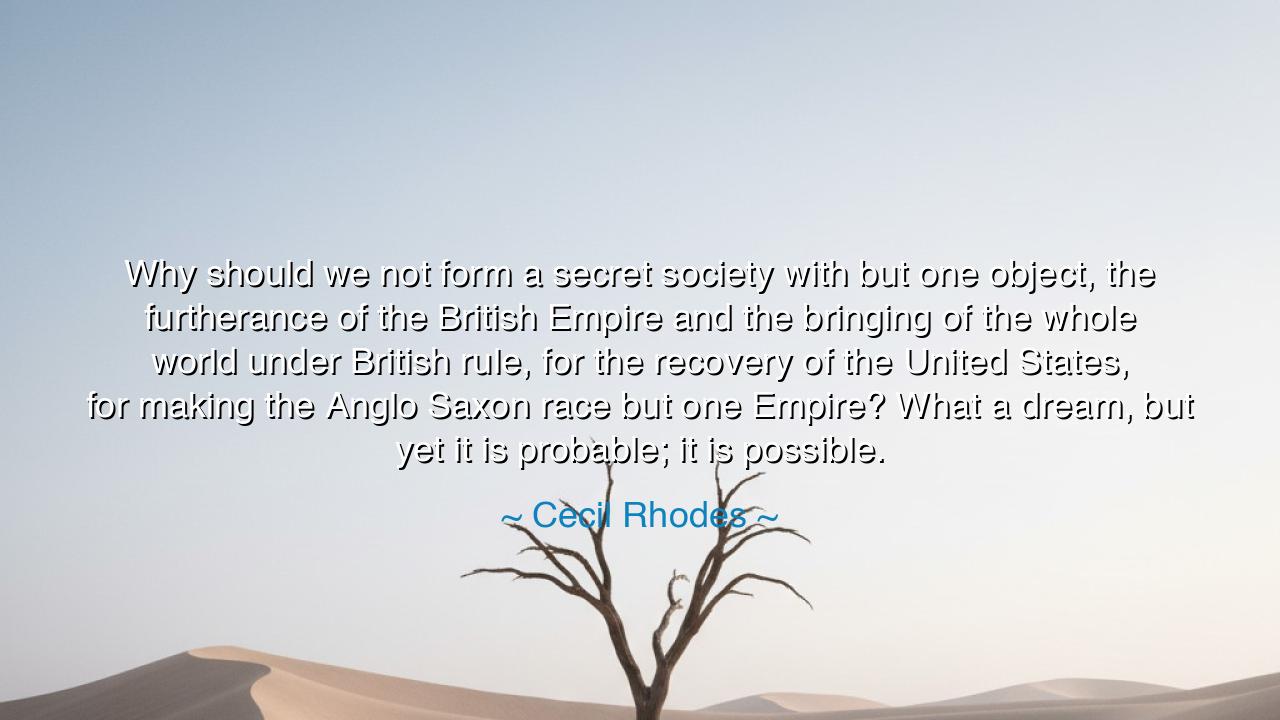
Why should we not form a secret society with but one object, the
Why should we not form a secret society with but one object, the furtherance of the British Empire and the bringing of the whole world under British rule, for the recovery of the United States, for making the Anglo Saxon race but one Empire? What a dream, but yet it is probable; it is possible.






Hear now the words of Cecil Rhodes, spoken with the fervor of ambition and the arrogance of empire: “Why should we not form a secret society with but one object, the furtherance of the British Empire and the bringing of the whole world under British rule, for the recovery of the United States, for making the Anglo-Saxon race but one Empire? What a dream, but yet it is probable; it is possible.” These words, though clothed in the language of vision, are heavy with the weight of conquest, domination, and the spirit of imperial pride. They reveal the fire that burned in the heart of one of history’s most ambitious empire-builders, a fire that sought not justice nor liberty, but dominion.
In Rhodes’s vision, the British Empire was no mere nation among nations, but a destiny. He saw it as ordained to rule, to stretch its arms across the seas, binding continents into one order, one race, one banner. The secret society he imagined was no brotherhood of enlightenment, but a cabal of power—men devoted to weaving the threads of conquest in silence, until the dream of universal dominion was made flesh. To him, even the United States, which had torn itself from Britain’s grip, was but a prodigal child, to be recovered and absorbed into the greater imperial fold.
Yet behind these words lies the historical soil of the nineteenth century, an age when Europe, swollen with industry and arms, carved up Africa, Asia, and beyond. Rhodes himself, in South Africa, became the architect of policies that enriched the empire while subjugating native peoples. His name became synonymous with both ambition and exploitation—mines that yielded diamonds and gold, but also the suffering of black laborers forced to toil beneath the earth. Here we see the living consequence of his dream: not the unity of mankind, but the exaltation of one race over others, the banner of the Anglo-Saxon raised above the broken backs of the conquered.
Consider the example of the Scramble for Africa, where European powers gathered in Berlin in 1884 to divide the continent like hunters portioning prey. No African voices were invited to the table. The words of Rhodes echo this same spirit—the belief that power justifies dominion, that the world is clay to be molded by the strong. His dream of a one-race empire was not merely a private fancy but part of a greater tide of thought that justified colonization, missionary zeal, and economic plunder in the name of civilization.
And yet, there is a terrible irony: Rhodes spoke of unity, but the unity he imagined was exclusionary, built not on dignity but on conquest. He dreamed of peace, but a peace maintained by chains. History shows us the flaw: empires built on domination do not endure. The British Empire itself, once stretching across the globe, unraveled in the twentieth century, undone by the very peoples it sought to bind. India rose in independence, Africa broke its chains, the United States did not return but grew into its own empire. The dream of Rhodes, though vast, proved fragile, for no vision rooted in injustice can stand forever.
The wisdom we must take from this is not to celebrate Rhodes’s ambition, but to understand it as a warning. When men dream of universal power, when they exalt one race, one nation, one culture as destined to rule, they plant seeds of suffering. True greatness does not lie in domination, but in cooperation; not in conquest, but in mutual respect. A society that seeks to shape the world by force will in time be broken by the resistance of those it sought to subdue.
The lesson, then, is this: beware the dreams of empire that clothe themselves in noble words but conceal hunger for power. Build instead a vision of unity that honors diversity, a fellowship of nations that shares rather than conquers. Learn from the failures of the past: the mightiest empires have fallen, but the bonds of respect endure. Therefore, O listener, let your actions be these: resist the arrogance of domination, honor the dignity of every people, and build a world where unity is forged not by force, but by justice. For though Rhodes spoke of possibility, it is our task to make possible a better dream—one not of chains, but of freedom.






AAdministratorAdministrator
Welcome, honored guests. Please leave a comment, we will respond soon